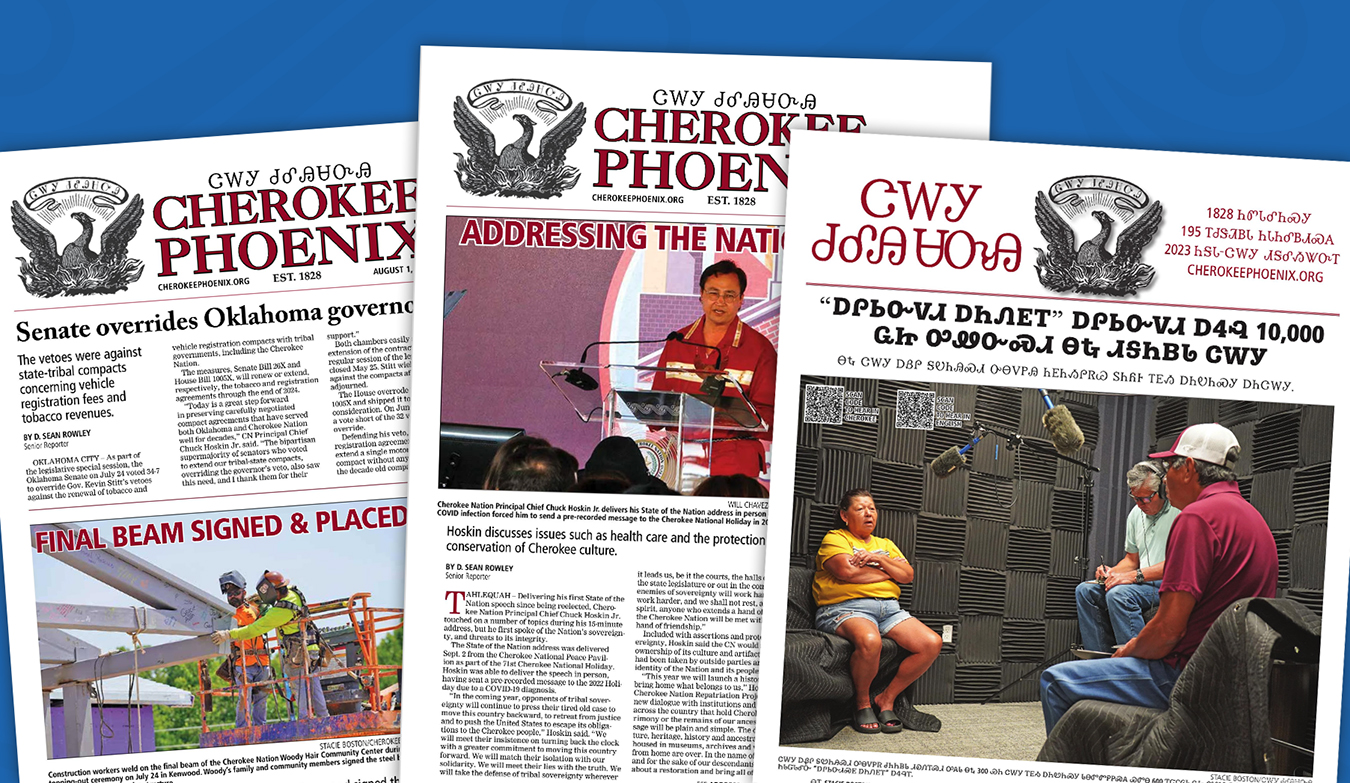
- Details
- By Chuck Hoskin Jr
Guest Opinion. Cherokee leaders throughout history have known that informed citizens are the backbone of our thriving democracy. Well-executed journalism strengthens tribal sovereignty and self-determination by ensuring that our government remains accountable and transparent. That is as true today as it was when the Cherokee Phoenix first began publishing nearly 200 years ago.
That is why I, in collaboration with Deputy Principal Chief Bryan Warner, the Council of the Cherokee Nation, and the editorial leadership of the Cherokee Phoenix, am proud to announce the expansion and continuation of the Cherokee Nation’s Free Phoenix for All Program. The timing is especially significant, with National Newspaper Week coming in early October to appreciate newspapers and their staffs across America.
Our initiative offers a free one-year subscription to any citizen who opts in through our online Gadugi Portal. The portal has also proven extremely effective in connecting citizens to services they can utilize. At the same time, it saves the nation critical dollars by giving an easy way for Cherokees to provide their most up-to-date contact information. Once you sign up on the portal, one subscription per household can be mailed anywhere in the country at no cost.
We started this program during the COVID-19 pandemic to help Cherokees stay informed of the news in this difficult time. The accurate, timely information provided by the Phoenix was crucial for Cherokee families and communities to receive updates on public health and recovery efforts. Now, we are renewing that commitment, because it is just as much of a priority to keep our citizens across the globe engaged on the workings of their government.
The Cherokee Phoenix newspaper has been a stalwart source of information for Cherokee people since its establishment in 1828. It was the first newspaper published by Native Americans in the United States and the first bilingual newspaper in the country’s history. It has played a pivotal role in communicating and sharing our story with the world.
Additionally, the Cherokee Phoenix has been a vital resource for preserving our language and keeping it in daily use. It continues to serve as a valuable tool for language learners and first-language speakers alike.

Today, led by Executive Editor Tyler Thomas, the Phoenix embraces its legacy of unbiased reporting about issues shaping Cherokee Nation. While the Cherokee Nation does provide funding for the newspaper, it remains entirely separate from the government. As a free press entity, the Cherokee Phoenix is overseen by an independent editorial board and offers a platform for a wide variety of Cherokee voices.
Cherokee Nation is one of the few tribes that has a freedom of the press act, which underscores our commitment to an independent media. This is vital because a free press holds elected leaders accountable. It is a value that will endure long after my term as Principal Chief. By renewing the Cherokee Nation Free Phoenix for All Program, we are reaffirming our commitment to open government.
I encourage our citizens to sign up for the Phoenix. As a subscriber, you will receive the latest information about tribal programs and services, special events, Cherokee communities, and the significant achievements by Cherokees worldwide.
The deadline for enrollment is Oct. 31. For those in need of assistance with the Gadugi Portal, our dedicated team is available at 918-453-5058 or via email at [email protected].
Chuck Hoskin, Jr. is the principal chief of the Cherokee Nation.
More Stories Like This
The Absence of October's Job Report Shows Why Native American Communities Need Better DataTribal IDs Are Federally Recognized. ICE Agents Are Ignoring Them.
Thanksgiving: Part of "Broken Circle Holiday"
Thanksgiving is a Tradition. It's Also a Lie
Decisions About Us, Without Us: Education Dismantling Ignores Tribal Nations
Help us tell the stories that could save Native languages and food traditions
At a critical moment for Indian Country, Native News Online is embarking on our most ambitious reporting project yet: "Cultivating Culture," a three-year investigation into two forces shaping Native community survival—food sovereignty and language revitalization.
The devastating impact of COVID-19 accelerated the loss of Native elders and with them, irreplaceable cultural knowledge. Yet across tribal communities, innovative leaders are fighting back, reclaiming traditional food systems and breathing new life into Native languages. These aren't just cultural preservation efforts—they're powerful pathways to community health, healing, and resilience.
Our dedicated reporting team will spend three years documenting these stories through on-the-ground reporting in 18 tribal communities, producing over 200 in-depth stories, 18 podcast episodes, and multimedia content that amplifies Indigenous voices. We'll show policymakers, funders, and allies how cultural restoration directly impacts physical and mental wellness while celebrating successful models of sovereignty and self-determination.
This isn't corporate media parachuting into Indian Country for a quick story. This is sustained, relationship-based journalism by Native reporters who understand these communities. It's "Warrior Journalism"—fearless reporting that serves the 5.5 million readers who depend on us for news that mainstream media often ignores.
We need your help right now. While we've secured partial funding, we're still $450,000 short of our three-year budget. Our immediate goal is $25,000 this month to keep this critical work moving forward—funding reporter salaries, travel to remote communities, photography, and the deep reporting these stories deserve.
Every dollar directly supports Indigenous journalists telling Indigenous stories. Whether it's $5 or $50, your contribution ensures these vital narratives of resilience, innovation, and hope don't disappear into silence.
 The stakes couldn't be higher. Native languages are being lost at an alarming rate. Food insecurity plagues many tribal communities. But solutions are emerging, and these stories need to be told.
The stakes couldn't be higher. Native languages are being lost at an alarming rate. Food insecurity plagues many tribal communities. But solutions are emerging, and these stories need to be told.
Support independent Native journalism. Fund the stories that matter.
Levi Rickert (Potawatomi), Editor & Publisher

